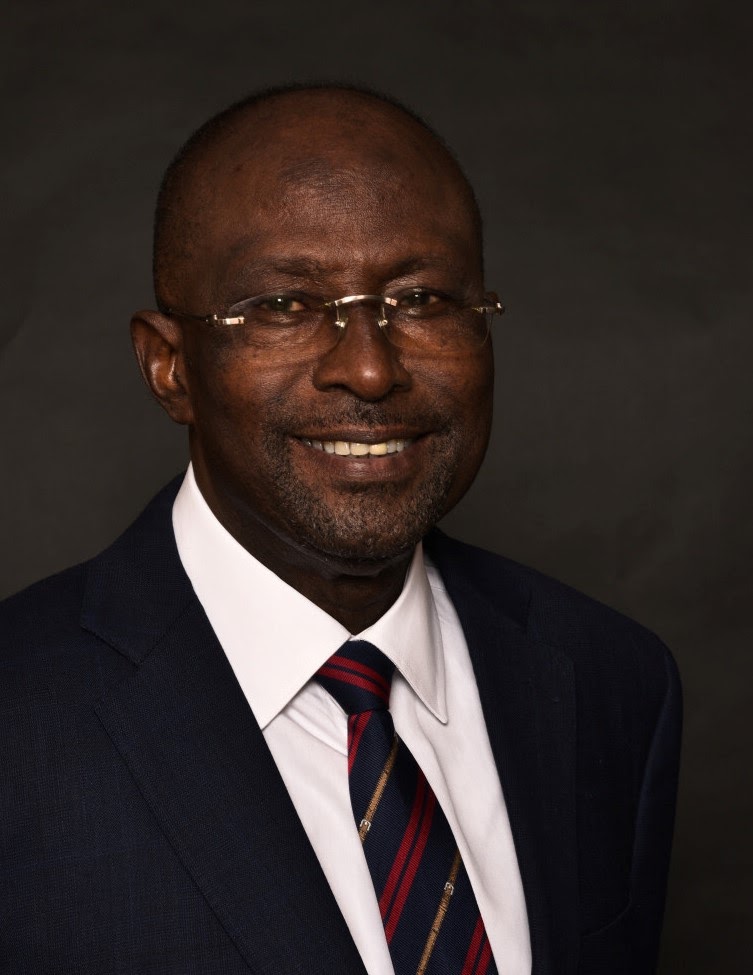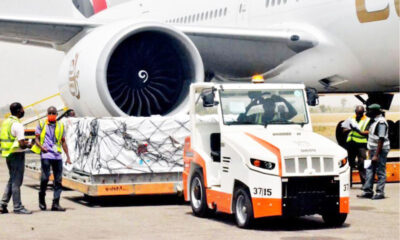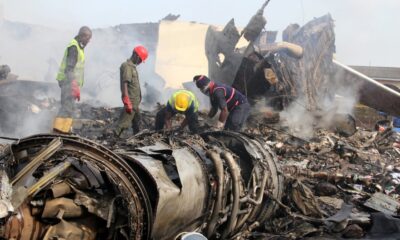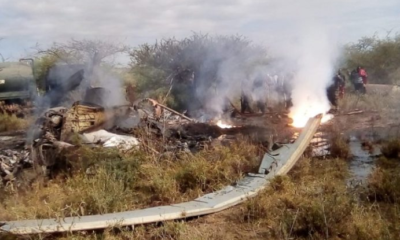Tech
EXCLUSIVE….Why there are fewer air crashes in Nigeria—NAMA boss
Capt. Fola Akinkuotu presently is the Managing Director/Chief Executive of the Nigerian Airspace Management Agency. The former Director-General, Nigerian Civil Aviation Authority, in this interview with STANLEY JOHN, addresses issues in the aviation sector. Exceprts:
As an industry expert, how are airlines and air travellers fairing after heavy fatalities and challenges posed by COVID-19?
First, COVID-19 is not yet over, it is still a concern globally. It has reduced and continues to reduce interest of passengers to fly. They are not very positive on the mandatory COVID-19 protocols particularly wearing of face mask throughout duration of a flight time. On the domestic route someone is required to wear face mask during a flight of about an hour/an hour plus. This is not comfortable. Passengers have to cope with this. You then find out that it is only on essential trips that most people embark upon by air and not leisure movements. On the whole COVID-19 has impacted very negatively on the aviation/tourism industry and it will take awhile before we ever get to pre-COVID numbers.
Is COVID-19 protocols not impacting negatively on the aviation sector: the airlines, government or aviation authorities and the travellers?
The impact of COVID-19 is far more notable in the sector perhaps much more than other sectors. Recovery is rather still very slow. Volume of air traffic and passengers globally are still very low. On the international route, there are still many restrictions and stringent protocols that are responsible for this. This translate directly to low or no revenue for all entities on the chain, air navigation service providers, airport authorities, airlines, handlers, etc.
How do you feel being the pilot that flew Pope John Paul II, all through during his Papa’s visit to Nigeria in 1998?
Humbled and extremely lucky. For me it was the best thing that has happened to me in my life and indeed a blessing.
There are fewer air crashes in Nigeria’s aviation industry nowadays. What could have been responsible for this positive development?
This is a good and encouraging news. There are many factors that can be attributed to it.
We now have better ground based navigation aids facilities, better air traffic services, better aircraft and on-board equipment, more stringent regulation, and better equipment for accurate weather forecast (We have Low Level Wind shear Alert System, Terminal Doppler Weather Radar etc.). We also now have better training across the sector, better response to safety regulations by airlines’ operators, more government commitment on oversight, etc. So, it is the synergy of many efforts.
What should be done to sustain or improve on this positive development?
We should identify what has worked and continue to improve on them. There should also be more training and retraining of pilots and other professionals in the sector. It is also important to have continuous investment in the sector especially on air navigation equipment and other ancillaries – air field lighting etc. In addition, there should be continuous enforcement of air-worthiness requirements, and continuous advocacy on safety net and compliance by airlines’ operators. There should be continous recognition by stakeholders that the continued airworthiness of an aircraft is not just for the regulator but also that of the operator, etc.
You speak as an expert in the aviation industry, let us get to know you more?
I trained as an Aircraft Engineer, Commercial Pilot and Flight Engineer. With Aircraft Maintenance Engineer License (A and C) from the Nigerian College of Aviation Technology, Zaria, I proceeded to various aviation institutions in pursuit of my chosen career. From Sierra Academy of Aeronautics, Oakland, USA, I obtained a Commercial Pilot License, Multi-Engine Rating, Instrument Rating and Flight Engineer’s License (Turbojet B727).
I also hold an Air Transport Pilot License (ATPL) from Sunnyside, Aviation Academy, New York; Type Rating Instructor’s Certification (B737) from Oxford Aviation Academy, United Kingdom and a Certificate in Total Quality Management (TQM) from Lagos Business School.
Armed with these certifications, I began my over 40 years foray into the aviation industry to pursue a career I cherish and so passionate about. My forays saw me as Pilot with Nigeria Airways, Kabo, ADC and Aero, clocking over 13,000 flying hours jet time.
In my career, I have held various positions, from Pilot In Command to Chief Pilot/Director, Technical Operations (ADC); Managing Director/COO (IRS), Head of Training, Director of Flight Operations, (Virgin Nigeria Airways) and Executive Director International Operations in Air Nigeria. I was opportuned to cap these with my appointment as the Managing Director/CEO of Nigeria’s oldest commercial airline (Aero Contractors).
Outside the airline portfolios, in my early years in the industry, I was an Examiner for the FCAA, the precursor to NAMA and later as Type Rating Instructor/Examiner for the Nigeria Civil Aviation Authority (NCAA). In the course of the years, I held top Management positions, which included: Managing Director (IRS Airlines), Managing Director/CEO, Aero Contractor, Rector/Chief Executive Officer, International Aviation College, Ilorin, Kwara State and the Director-General, NCAA, all before assuming the position of MD/CE at NAMA.
Is a national courier desirable for Nigeria? If yes, what will be its benefits to the country?
Yes, it is desirable. Benefits are numerous when implemented correctly. Direct flights between Nigeria and many international routes can be exploited. It can also lead to reduction of air fares paid by Nigerians because of competition on such routes. Thirdly, it will lead to development of skilled manpower for the sector. Don’t forget how the Nigerian Airways developed many skilled manpower for the sector some of which are still very active and are still developing the sector today. In addition, it will provide employment for a huge number of our people, create tons of indirect employment and aviation support businesses.
Is it not sad that Nigeria is yet to have a national carrier in spite of the proposal by the Minister of Aviation, Senator Hadi Sirika, and the money already spent on the project?
No. not at all. Setting up a national airline that will stand the test of time requires a lot of painstaking processes, especially after the experience with Nigerian Airways. Even though the airline is yet to be operational, a lot has been done in actualizing it and in no distant time I believe we will see the manifestation. Simply put, some time is needed to put in place an enduring airline for the country.
Could you proffer strategies for the actualization of a national carrier?
I believe the strategy of Public Private Partnership that is being proposed by the Honourable Minister is the best way to go. We need an airline that is led by private industry and investment, technical partnership with reputable airlines with profitable and good safety records.
Airlines owners in the country are lamenting non-sufficiency of aviation fuel. Is this problem not negatively affecting the industry? What should be done to address the menace?
I think it is not a good business model when you have to import the most recurrent input for your business from a far place. None of the refineries in the country is currently producing Jet A1, not even in a small quantity. So, all demands are met by importation. It means airlines have to buy it at expensive price. Perhaps above 31% of airline operators’ running cost is on aviation fuel. To break even in such a situation and high costs of JetA1 fuel is a little bit difficult. There should be concrete plans to produce the fuel in the country.
How do you feel about the springing up of airlines by some states and even individuals such as Ibom Air etc?
It is a good development. Don’t also forget that population in Nigeria is an advantage. With a population of about 200 million people in Nigeria, even if only 1% fly, there must be good number of airplanes to transport them without undue delay. However, I think we need to see more airlines with large fleet of aircraft rather than many airlines with insufficient aircraft after a short time of operation.
Some state governors have completed airports in their states such as Anambra and Bayelsa. What is the import of this to the aviation industry?
My personal opinion is that siting airports anywhere should be based on economic viability. An airport should support economic activities and not as a symbol. If the airport cannot sustain its various operations revenue-wise through economic activities of flight patronage and money has to be taken from some other airports or sources to fund the unprofitable airport, then it is not viable. By economic theories, is such an airport necessary? However, more viable airports in the country is a blessing as it will encourage people to fly more.
How has your organization impacted positively on the aviation sector?
Air navigation services provision is one of the major drivers of modern aviation. Just imagine that there are no air traffic controllers, no ILS facilities, and no radio systems to communicate with the pilot, no radar systems to monitor the aircraft position in the sky, will it be safe for any pilot to attempt flying? Will it then be out of place to say no NAMA, no flying. That is the impact an air navigation service provider like NAMA has on the aviation sector. More development in NAMA will translate directly to safer skies, more revenue and more development in the sector.
Could you suggest strategies to grow the aviation industry?
I think more investment is needed in the aviation sector especially in Nigeria. By this I do not mean only government money. There are many Public – Private partnership opportunities in the sector that will bring about robust and sustainable growth. For example, there are many aircraft in the country today that need various levels of maintenance which are usually done outside the country. Why are there no large Maintenance companies (MROs) in the country to take advantage of this and reduce capital flight on maintenance pilgrimage? This is yearning for investment.
Contact: info@royalnews.com.ng








